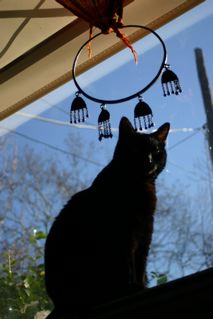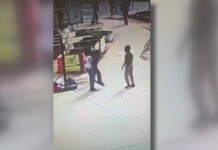 The first time Doris Barton phoned me, I was having a bad day… I probably answered by barking my name like a perturbed Jack Russell terrier. Undeterred, she said, "I just want to tell you reading your column makes my day." … Doris had me at hello after that. This retired lady rang me, maybe, once a month over the past five years, and her message was almost always affirming: "You’re getting better and better" or "you’re really going great, girl."…
The first time Doris Barton phoned me, I was having a bad day… I probably answered by barking my name like a perturbed Jack Russell terrier. Undeterred, she said, "I just want to tell you reading your column makes my day." … Doris had me at hello after that. This retired lady rang me, maybe, once a month over the past five years, and her message was almost always affirming: "You’re getting better and better" or "you’re really going great, girl."…
GNN-i is pleased to bring you a recent column by Colleen Cason originally published on November 22, 2006 in The Ventura County Star:
The first time Doris Barton phoned me, I was having a bad day.
A columnist’s bad day is hardly as bleak as, say, a brain surgeon’s. Although on a bad day, we are both capable of putting someone into a vegetative state with our handiwork.
But a bad day for me is when ideas and words won’t come, but the toxic e-mails and phone calls arrive fast and furious.
On the day of Doris’ first call, I probably answered by barking my name like a perturbed Jack Russell terrier.
Undeterred, she said in her I’m-just-folks tone, "I just want to tell you reading your column makes my day."
Doris had me at hello after that. This retired lady rang me, maybe, once a month over the past five years, and her message was almost always affirming: "You’re getting better and better" or "you’re really going great, girl."
When my work appeared on the front page, she noted my bosses finally had reunited with the senses they had taken leave of by not putting it there every day.
As our telephonic relationship progressed, Doris came to feel comfortable enough to critique my efforts.
"That column Friday was too political," she said.
"Define political, Doris," I replied.
Doris preferred to change the subject; she never wanted our exchanges to be edgy. Basically, I would do well to stick with columns about the underdog, she advised.
And a few of my columns she found too personal.
"Did you have to do that? she asked. As if by bearing my soul I had done the journalistic equivalent of letting my bra strap show during an audience with the pope.
But if I asked her a personal question, her lips froze as if overdosed with Botox. Doris only hinted at quarrels in her family. But she loved talking about her grandchildren.
Doris was having a bad day last spring, the only time I saw her in person. This woman with an agile, active mind was bed-ridden and on oxygen. Her beloved and ancient lapdog Baby snoozed by her side.
"I don’t want to die, but I don’t want to live like this," she told me.
After all her heartening words, I could think of not one to say to her.
A Tribute to Doris
Doris died Oct. 28 of chronic obstructive pulmonary disease in her apartment at a Moorpark senior complex.
Upon seeing her obituary, I felt in my gut how much her calls had meant to me and how grateful I had been to have my own personal cheerleader.
A couple of paragraphs in the obituary hinted at the losses she never shared with me.
Even her little dog Baby died two weeks before Doris did.
At her funeral at St. Maximilian Kolbe Church in Westlake Village, I discovered her oldest daughter, Barbara Murphy, had not known her mother and I were phone buddies.
Only after her death would I learn why Doris loved stories about the underdog.
She had been one all of her 78 years. Doris was brutally assaulted when she was a 5-year-old living in Pennsylvania. Her home was far from nurturing. Despite her obvious intelligence, she never graduated high school.
"Mother didn’t have a lot to work with from her childhood," Murphy told me.
Doris had to take any job she could find, including working in a glass factory — which probably contributed to her lung disease.
She married young and had three children, boom-boom-boom. Then one day, her husband went out for the proverbial pack of cigarettes and never returned. He even took the car.
She struggled as a single mother to feed her family, working as, among other things, a guide at Disneyland and a car hop.
The family moved often between Northern and Southern California, Murphy recalled. Later in life, Murphy realized it might have been because Doris was short on the rent money.
But the worst blow came in 1996 when Doris’ daughter, Jane, died young of lung cancer.
"For years that broke the family," Murphy said.
The grief was so extreme and everyone bore it in a different way, she explained, that for 10 years the family rarely gathered.
In the past couple of years, Murphy came to understand her mother and learned to ride out the turbulence in their relationship.
I asked Murphy why she thought her mom had found it in herself to be so supportive of me even as she struggled to take a simple breath.
"In you, she had something clean and fresh with no history. That made her feel valuable and smart," she told me.
We Can All Do What Doris Did
In fact, we all have it in us to do what Doris did. No matter how scant our bank account. No matter how little time. No matter how badly we may feel about ourselves. How inadequate we feel. No matter how poor or cheated we are. No matter our failings.
We can pick up the phone today and every so often to speak a few inspiring words to someone, anyone.
We all have it in us to be a Doris Barton.
The people you call will never forget you, especially on the bad days.
or phone her: 655-5830




















like a warm cup of cocoa
What a lovely article! Thank you so much for sharing it.